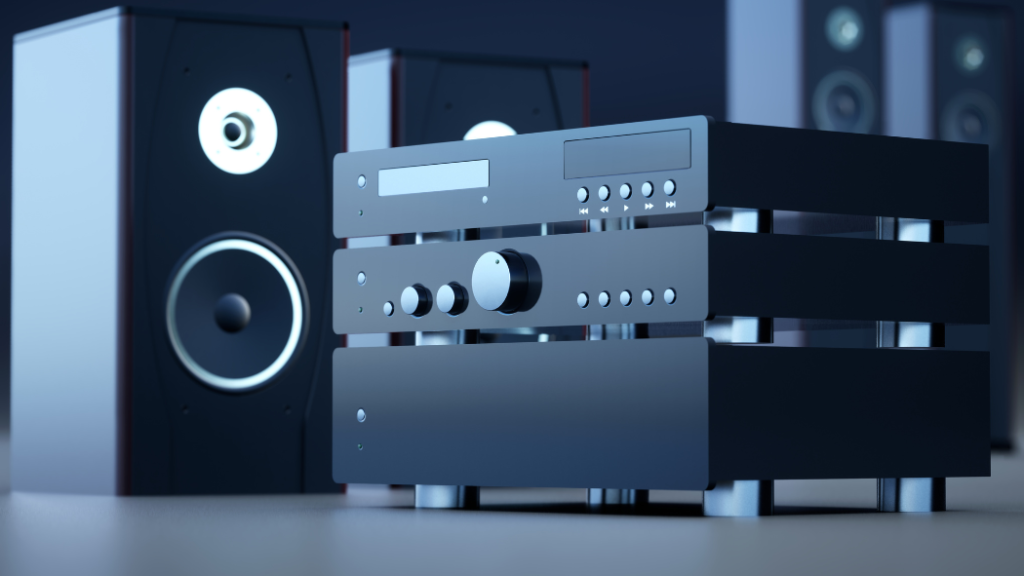
Commercial audio systems are a need in many different types of commercial settings. These systems can be found in corporate offices, retail stores, restaurants, and large event areas. They are made to deliver high-quality sound for audio requirements such as music and announcements. A thorough understanding of commercial audio systems can greatly impact your decision-making process, whether you’re installing a new sound system or updating an old one for your company.
This beginner’s guide will walk you through the key elements of commercial audio systems, with a focus on popular setups like commercial pendant speaker systems and hanging ceiling speakers. We’ll cover how they work, their benefits, and tips on selecting the right components for your specific business environment.
What Is a Commercial Audio System?
A commercial audio system is considerably developed for playing sounds to people over a large commercial region or to numerous rooms at once. Commercial home audio systems are stronger and more flexible compared to home audio systems that are intended for a singular room or a few. It can cater to several audio requirements or applications, inclusive but not limited to background music, public address, or voice announcement.
These systems are commonly installed in restaurants, retail outlets, hotels, airports, offices, and many other places. The objective is to construct an audio climate that will improve the impression of the customer as well as the employee, promote clear information exchange, and complement the general environment.
Key Components of a Commercial Audio System
While there are many variations of commercial audio systems, most setups include the following basic components:
- Louders: The louders are meant to produce the sound that is to be heard by the audience. Under the space used as well as the type of audio system used, there are various types of speakers that may be used, which include commercial pendant speakers, ceiling speakers, and wall-mounted ones as well.
- Amplifiers: The amplifier increases the sound signal so as to let it go out freely over the speaker. Most of the time, the size and power of the amplifier will depend on the number of speakers and the size of the area in which the sound will be played.
- Audio Source: This can be a music source, a paging microphone, or perhaps a computer system that may control the audio announcements. The audio source is the device through which the audio signal is transmitted to the other hardware component, which is the amplifier.
- Cabling and wiring: These are used to connect all components. High-quality wiring ensures that the audio signals are transmitted without interference or loss in quality.
- Control Systems: This is where you control the audio system, managing everything from volume to sound zones. Some systems also allow for remote control through mobile apps or integrated smart systems.
Now that we’ve covered the essential components, let’s dive into some popular speaker options, specifically commercial pendant speaker systems and hanging ceiling speakers.
Commercial Pendant Speaker Systems
Commercial pendant speaker systems are a popular choice for businesses with high ceilings or large, open spaces. These speakers are suspended from the ceiling, hanging down like a pendant (hence the name). They are perfect for delivering high-quality sound in environments where traditional ceiling or wall-mounted speakers may not be ideal.
Benefits of Commercial Pendant Speaker Systems
Designed for High Ceilings: Pendant speakers are convenient if your business premises have a high ceiling. Conventional ceiling-mounted speakers may not give clear sound in such environments, mainly because they are far away from the listener. Pendant speakers, on the other hand, can be mounted closer to the audience, which makes the sound clearer.
Wide Area Acoustic Coverage: These systems are able to cover the entire room equally or with specific designs for big conventionalized spaces like malls, big storage spaces, and event centers. Since they can be hung in different areas, it is easy to ensure that the sounds are well distributed throughout the hall.
Design: Pendant speakers are designed in a sleek modern look that blends with a modern setting. These guarantees make sure that they’ll blend appropriately with the interiors when offering robust sound quality at the same time.
Flexibility: They can be used for any kind of audio aspect of a business and can be used for background music, general announcements, or voice paging. These are useful across a number of sectors, from more commercial applications, such as in a shop or store, to more heavy-duty use, such as in an industrial setting.
Superior Quality Sound: Pendant speakers are developed with clear and high-quality sound and thus can be used for business places like restaurants, companies, or entertainment centers.
Where Can I Install My Commercial Pendant Speaker Systems?
- Retail Stores: In places where the business owner is more concerned with the comfort of customers, then they can consider the pendant speakers to play background music.
- Restaurants: These speakers can also distribute music evenly across the venue for guests to dine while having their conversations uninterrupted.
- Warehouses and Factories: Pendant speakers work well in large, industrial spaces where traditional speakers may not provide adequate coverage.
Hanging Ceiling Speakers
Another popular option for commercial audio systems is hanging ceiling speakers. As the name suggests, these speakers are installed directly into the ceiling, providing a sleek, unobtrusive way to distribute sound throughout a space. They are often found in businesses where the discreet placement of speakers is important for the overall design aesthetic.
Benefits of Hanging Ceiling Speakers
- Ease of Installation: Hanging ceiling speakers are installed into the ceiling, and this makes it hard to notice them. This is particularly appropriate in firms that wish to avoid the sight of obvious and complicated equipment that mar the sleek appearance of the business.
- Ceiling-mounted: This style of speaker does not clutter up the floor or wall space, which makes it space-saving. This can be especially true in more limited business areas, especially in retail and other forms of commerce.
- Uniform Sound Coverage: Like with pendant speakers, ceiling-mounted speakers can also be used to give uniform coverage in a room. This makes them perfect for use in places where you desire to have a good supply of sound all over the place.
- Wide Range of Applications: Ceiling speakers can be suspended on the ceiling and used to provide background music, voice announcements, paging systems, and others in several facilities. Owing to this flexibility, they can be used in offices, retail stores, hotels, and other institutions, such as schools.
- Customizable Audio Zones: This way, one of the principal benefits associated with ceiling speakers is the opportunity to establish audio zones. This lets you manage the sound in various parts of your company; it also gives you individual control. For instance, it is possible to play different tunes in the dining section, the section with a bar, and outside dining all at one go.
Where to Use Hanging Ceiling Speakers
- Offices: In corporate settings, these speakers can provide background music or be integrated into conference room setups for presentations or video calls.
- Hotels: In hotel lobbies or hallways, hanging ceiling speakers can provide soft background music to enhance the guest experience.
- Healthcare Facilities: These speakers are often used in healthcare environments for background music or paging systems that ensure important announcements are heard clearly.
Choosing the Right Commercial Audio System for Your Business
Selecting the right commercial audio system depends on several factors, including the size of your space, the purpose of the system, and your budget. Here are some key considerations:
1. Size and Layout of the Space
The first task in choosing the right audio system therefore lies in identifying the size and density of the working establishment. For larger areas, more voluminous speakers or more speakers will be necessary in order for the sound to diffuse evenly. For instance, if your business is located in a big warehouse, then purchasing a commercial pendant speaker system would be appropriate for delivering sound throughout the store. Some ceiling speakers may be hung from the ceiling, which is more discrete and also gives an efficient approach in small areas.
2. Purpose of the Audio System
Secondly, it is necessary to identify its function and its position in the total list of systems as a whole. Are you utilizing it more often as the background music that helps to set the mood of the room? Do you require a highly sophisticated communications system for loudspeaker/paging applications? There are cases where a firm might have both a continuous and a discrete demand schedule but in different product lines or markets. Pendant speakers are normally fine for big open spaces where you require high volume and clarity, and on the other hand, ceiling-mounted ones are usually ideal for wells, restaurants, or offices.
3. Audio Zones
Some businesses may need different audio settings for various sections of the business; the systems that should be selected should support this. That lets you play various sounds in distinct areas of your commerce. For example, when choosing music to be played in the restaurant, you might prefer quiet music in the dining area, while you would prefer more loud music in the bar area.
4. Links to Other Systems
Most of today’s commercial audio systems are capable of interfacing with other technology within your business premises, for example, security systems, fire alarms, or smart home controls. For instance, in a hotel environment, one might wish to link the public address system to the fire alarm system so that all messages on the alarm system reach clients loud and clear.
5. Budget
Last but not least are costs. They can cost anywhere compared to less expensive systems, ranging from the cost of the number of speakers and the power of the amplifiers to the level of control the system can introduce. Be sure to set a proper budget in your mind, which should dictate the fact that higher-priced systems will often sound and operate better than their cheaper counterparts.
Conclusion
A commercial audio system serves as a way of improving the experience of customers or employees for a business. Whether it’s commercial pendant speaker systems for large open spaces or hanging ceiling speakers for a far more subtle look, the system will deliver clear, high-quality sound for the task.
This gives you a basic guideline of what is included in commercial audio systems and the advantages of one form of speaker over the other, hence preparing you for the best option to take while using the commercial audio system for a business.




